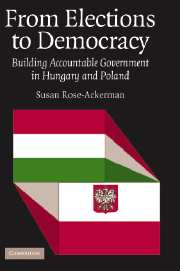Book contents
- Frontmatter
- Contents
- List of Tables
- Preface
- 1 Policy-Making Accountability and Democratic Consolidation
- 2 Alternative Routes to Policy-Making Accountability
- 3 Legacy of the Past
- 4 External Accountability and the European Union
- 5 Oversight
- 6 Decentralized Political Accountability
- 7 Public Participation in Policy Making: Government Procedures
- 8 Civil Society Groups: Overview
- 9 Environmental Advocacy Organizations in Hungary
- 10 Student and Youth Organizations in Poland
- 11 Democratic Consolidation and Policy-Making Accountability
- Appendix 1
- Appendix 2
- References
- Index
6 - Decentralized Political Accountability
Published online by Cambridge University Press: 23 July 2009
- Frontmatter
- Contents
- List of Tables
- Preface
- 1 Policy-Making Accountability and Democratic Consolidation
- 2 Alternative Routes to Policy-Making Accountability
- 3 Legacy of the Past
- 4 External Accountability and the European Union
- 5 Oversight
- 6 Decentralized Political Accountability
- 7 Public Participation in Policy Making: Government Procedures
- 8 Civil Society Groups: Overview
- 9 Environmental Advocacy Organizations in Hungary
- 10 Student and Youth Organizations in Poland
- 11 Democratic Consolidation and Policy-Making Accountability
- Appendix 1
- Appendix 2
- References
- Index
Summary
If a country's central government suffers from insufficient popular control, one option is decentralization to lower level governments that are “closer to the people.” Neither Poland nor Hungary is a federal state, but municipal governments have locally elected governing bodies. Both countries also have broader territorial administrative units that oversee the operation of municipalities and exercise some central government functions. In Poland, these bodies have directly elected councils.
The socialist past has influenced the debate over government structure in both countries. That legacy has led to a distrust of centralized authority, with some observers supporting the devolution of more power downward. However, regional inequalities mean the central government provides considerable funding for lower-level governments and hence must monitor its use. These opposing pressures have produced conflict over government organization and authority in both countries. Debate over the proper division of authority remains contentious.
Data from the European Values Study 1999/2000 suggest a sharp difference in public attitudes between Poland and Hungary (Table 6.1). Poland is more like Central and Eastern Europe as a whole with more than half the respondents preferring more devolution. In contrast, in Hungary there is little support for increased devolution, even though the country is currently more centralized. Apparently, any support for devolution that accompanied the change in regime in Hungary has largely dissipated.
- Type
- Chapter
- Information
- From Elections to DemocracyBuilding Accountable Government in Hungary and Poland, pp. 100 - 125Publisher: Cambridge University PressPrint publication year: 2005



